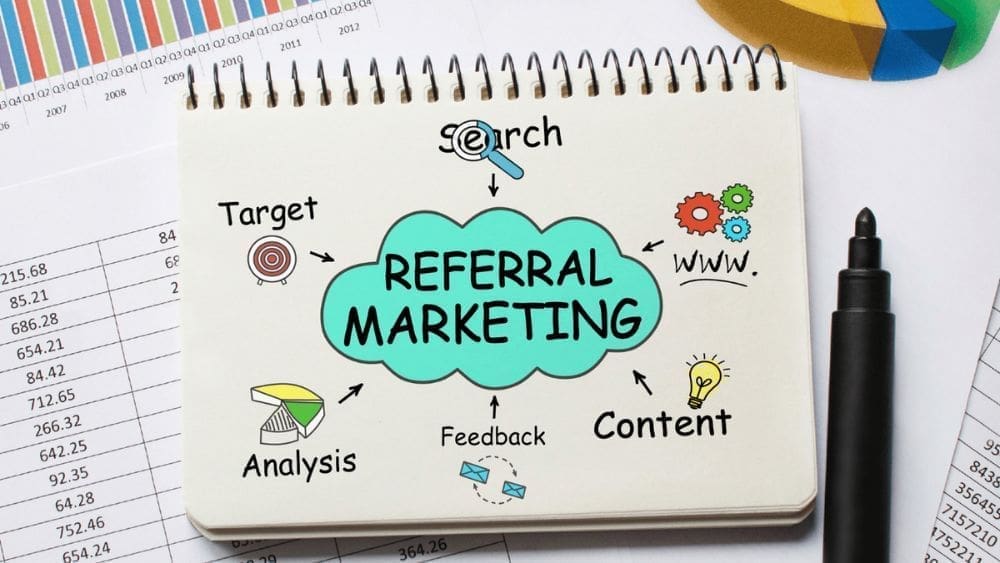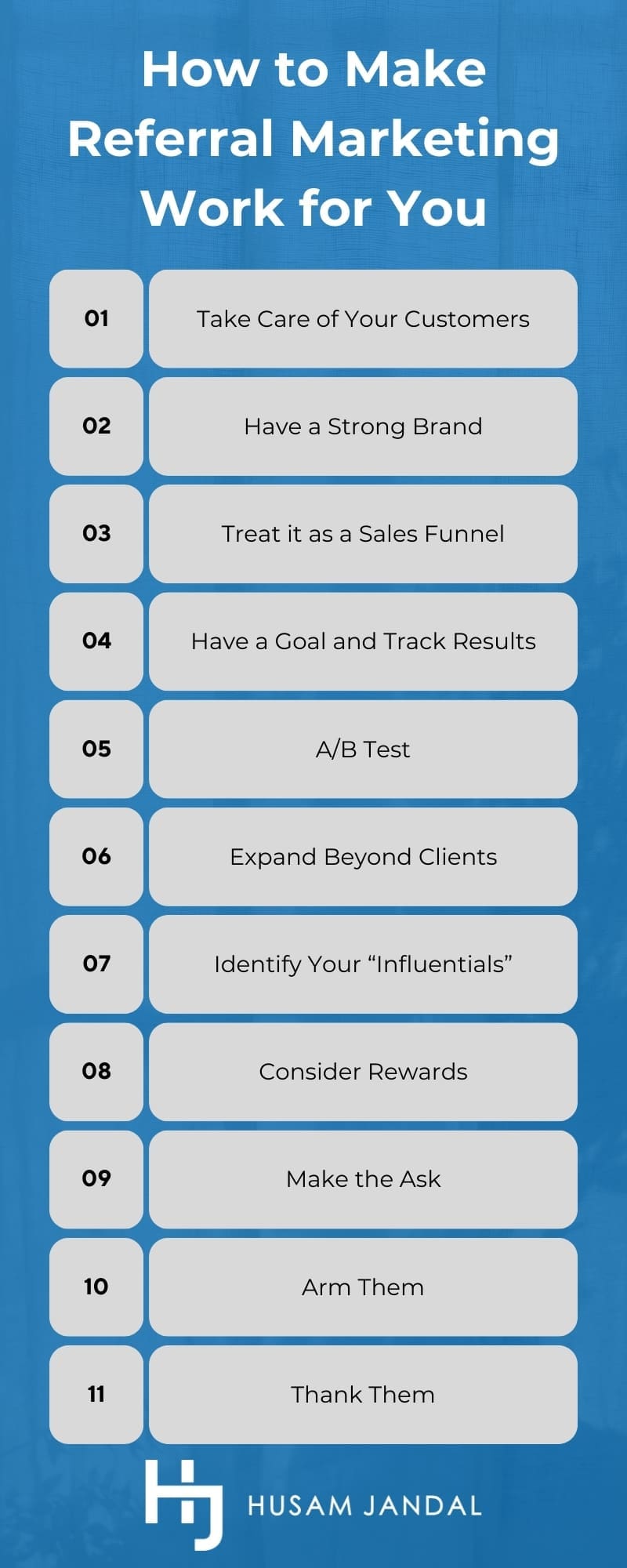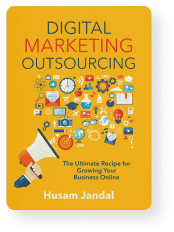 Do you have a loyal base of clients or business contacts? With referral marketing, you can turn these relationships into more new clients and grow your business exponentially. Give me a few minutes and I’ll teach you the mechanics behind successful referral programs, so you can develop a custom one that works for your audience and industry.
Do you have a loyal base of clients or business contacts? With referral marketing, you can turn these relationships into more new clients and grow your business exponentially. Give me a few minutes and I’ll teach you the mechanics behind successful referral programs, so you can develop a custom one that works for your audience and industry.
What is Referral Marketing?
A typical consumer mentions 56 brands in conversation each week, according to Deloitte research. While that may sound like a lot, it’s important to consider the figure in context. These are mere mentions. It’s people talking about the shirt they’re wearing, where they went for lunch, which social media network they just posted on, and so forth. Although there’s value to these discussions, it’s not quite the same as someone recommending a brand, and it doesn’t happen nearly enough.
Sometimes referred to as word-of-mouth marketing or earned advertising, referral marketing is a tactic used to help make these conversations more goal-oriented and increase the frequency in which your brand is mentioned.
Understanding Different Types of Referral Marketing
Brands can work with lots of different groups when creating a referral marketing strategy. For example, let’s say you’re an attorney who specializes in business law. You may know attorneys in other fields or perhaps have good relationships with accountants and insurance brokers. You can build a referral marketing campaign to cater to them.
However, the most common form of referral marketing is often referred to as “experiential.” It means the person referring someone else to your business has personal experience with your products or services. They’re either a current or former client. As much as 80 percent of referrals fit into this category, according to McKinsey.
Sometimes people refer because they have seen your business in action, have been exposed to your marketing messages, or are paid to refer in an influencer capacity too.
What Makes Referral Marketing Worthwhile?
A well-planned and implemented referral marketing strategy can help your business grow exponentially.
- Trust: Building trust is essential for client relationships and closing sales. In all, 84 percent of people say recommendations from friends and family are the most trustworthy source of info per Nielson.
- Influence: Word-of-mouth drives up to 50 percent of all purchasing decisions, according to McKinsey. Roughly one in three people who come to a brand are referred per Deloitte.
- Conversion: People who are referred typically come to a business primed with positive information. They’re four times more likely to buy, according to Nielson research.
- Retention: People referred by loyal clients have a 37 percent higher retention rate than their counterparts, keeping churn rates lower per Deloitte.
- Lifetime Value: Clients who come to your company through word-of-mouth have two times the lifetime value of those acquired through traditional marketing, per research published in the Journal of Marketing. The same study shows the referred clients bring in twice as many new clients too.
How to Make Referral Marketing Work for You

Now that you’ve got some background on what referral marketing is and why it’s such a powerful tool, let’s dig into the mechanics behind creating a successful referral program.
Take Care of Your Customers
Before you begin any referral marketing campaigns, make sure your current clients are happy. First, it costs anywhere from 5 to 25 times more to acquire a new client than retain an existing one, per Harvard Business Review. If you’re constantly trying to attract new clients as your current ones flee, your business is going to suffer. Second, only happy customers refer. Always start by addressing any customer service or product issues to ensure your referral marketing program starts on solid ground.
Have a Strong Brand
Good branding is essential to all your marketing efforts. Many people think of it in terms of logos and color schemes, but it’s more about the essence of your company. It’s your voice and what your business stands for. If you haven’t set this foundation before kicking off a referral marketing program, those promoting you won’t know what message to convey. Make sure it’s clear what you stand for so your promoters can relay your mantras as if it’s second nature to them.
Treat it as a Sales Funnel
A traditional customer-focused sales funnel goes something like this:
- Awareness
- Interest and Evaluation
- Desire
- Action
The concept is used in marketing all the time. You must introduce a prospect to your brand, pique their interest, show them why they need your solution, and then inspire them to action. The messages the prospect receives need to be tailored to their situation and where they’re at in the funnel.
The same is true for your referral marketing program. You’ll need to build out touchpoints at each stage to walk your promoters through the program and why they should participate.
Have a Goal and Track Results
No matter what type of digital marketing activity you’re engaging in, it’s important to be able to tie it back to the bigger picture and ensure it’s delivering ROI. Identify your goals ahead of time. For example, you may want to set a target for total referred clients each month or set a target related to total referral program participants.
You’ll also need to determine the best way to track results. This can be done through website analytics, tracking form submissions, a field in your CRM, and a variety of other ways. Bear in mind, however, that your tracking should be built to scale. When your program gets off the ground, you don’t want to be tallying up the results manually every month.
A/B Test
Just as you would with any other aspect of your digital marketing, your referral campaigns should leverage A/B testing too. Everything from your subject lines to rewards and images should be tested against another variant to ensure you’re getting the best results possible.
Expand Beyond Clients
Your current clients are probably going to be your best referral sources but don’t limit yourself to just this group. Think through who else shares the same customer base as you or who might be in a position to send people your way and develop campaigns that speak to the needs of each group.
Identify Your “Influentials”
When you’re marketing at scale and leveraging automation, it’s incredibly easy to reach lots of people at once. This is good practice, but it’s important to note that some of your promoters will be more impactful than others.
Roughly 8 to 10 percent are what McKinsey refers to as “influential.” These are people who are competent and trusted by the people around them and, therefore, have four times more impact on the purchasing decisions of those around them. They also generate three times more word-of-mouth messages than their counterparts.
If you’re doing a good job of tracking, it should become apparent who your influentials are based on the numbers. You may want to consider giving these promoters a bit of extra attention or perhaps even develop a special program just for them.
Consider Rewards
Rewards can boost the number of referrals you receive and increase positive sentiments about your program. 9 in 10 referral programs offer double-sided rewards per SaaSquatch research. That means both the promoter and the referred client receive something from the referral relationship. According to their surveys, the most popular rewards are as follows:
For Promoters
- Dollar Credit (50%)
- Gift Card (17.6%)
- Percent Discount (9.8%)
For Referred Clients
- Dollar Credit (53.8%)
- Percent Discount (23.7%)
- Gift Card (6.4%)
Other commonly leveraged rewards include free subscription time, cash, points, free products, and internal currency.
Be sure to run a cost analysis to ensure any rewards you’re offering ultimately have your business come out on top. If you’re in a sensitive industry like healthcare, you may also want to check your local laws to ensure there are no conflicts.
Make the Ask
Some businesses do well with contests. For example, it’s somewhat common for retailers to give people entries into a gift card raffle for each referral. If you run a B2B company, however, you’re more likely to find success through one-on-one relationship building and a formal request for referrals.
- Consider the language you’re using. For example, you may get better results by asking for an introduction rather than a referral.
- Ask for help. Let your prospective promoter know that you appreciate their help and tell them how their referrals are essential to the health of your company.
- Make it clear who you help. People won’t always know who they should send your way or what you’ll do for that person. Fill in the blanks to give them more confidence when referring.
- Reach out in multiple ways. Use a mix of calls and emails to get the ball rolling. Adapt your strategy based on interest and what’s working best.
Arm Them
The easier you make it for people to refer, the more they’ll do it. A few things that may work include:
- Special codes or links. If you’re building a large-scale program, you may want to invest in referral marketing software that automatically generates special codes or links each promoter can share.
- Automated imports. If possible, save your promoters time and allow them to select from their contact lists directly.
- Promotion kits. Design a welcome package for your promoters that includes everything they need to help spread the word. For example, you may want to give them email templates they can send out to their contacts, landing page content, or social media posts.
Thank Them
Depending on your industry, an automated thank you note may be enough. However, it’s best practice in most professional industries to pick up the phone and properly thank someone each time they refer. This personal touch doesn’t happen nearly enough, so it’s sure to have a big impact on your promoter and encourage them to continue sending people your way.
Boost Your Digital Marketing Strategy with a Successful Referral Program
Referral marketing is one of the strategies I routinely leverage as a digital marketing consultant. I’ve personally seen it help businesses rapidly scale time and time again. However, it’s important to have the right things, such as branding, automation, and service, in place before you start. If you’d like to strengthen your digital marketing, contact me for a complimentary consultation.





































































